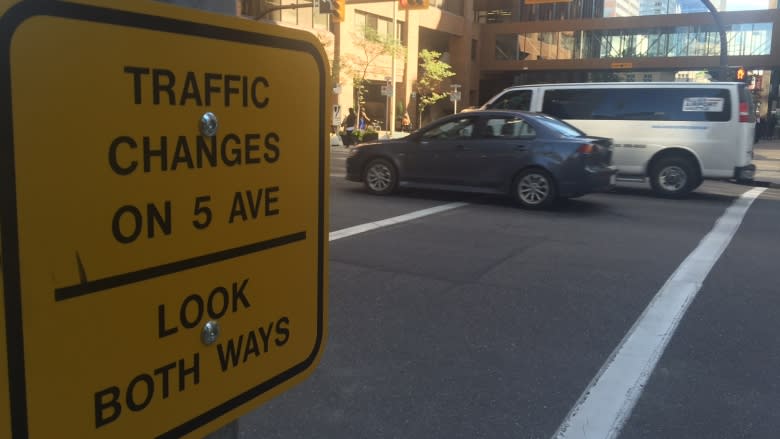Sensors being installed to stop trucks from hitting Plus 15s and bridges
The city plans to install infrared sensors under seven bridges and Plus 15s in the downtown core to stop trucks and other large vehicles from crashing into them.
"As an overheight vehicle approaches, the infrared light will take note of that and there will be a screen, either on the Plus 15 or the bridge, that will flash and tell the vehicle they are overheight and to either stop or if they can still turn off, to take an alternate route," said city spokesperson Tara Norton-Merrin.
"When trucks get stuck under our bridges or Plus 15s, we haven't had a lot of really serious incidents that have damaged the structures, it's more about the safety of the drivers in the vehicle and the time it takes to get these vehicles unstuck and the traffic impacts."
- MORE CALGARY NEWS | Unicorn Pub staff plead for the return of beloved pig Henry
- MORE CALGARY NEWS | City apologizes after privacy breach of 3,716 WCB files
A similar warning system is already in place on the lower deck of the Centre Street Bridge, which Norton-Merrin said has been successful in reducing the number of crashes there.
Plus 15s were hit three times and bridges 15 times in 2015 — with the lower deck of the Centre Street Bridge accounting for 10 of those, said Norton-Merrin. By comparison, previous years saw the lower deck hit up to four times a month.
"Our cost estimate savings since putting in that detection unit… is about $300,000 a year," said Norton-Merrin.
Costs for installation and maintenance of the sensors over the next three years are estimated to be $150,000.
Truck driver Jasvar Singh said the sensors will save him from having to stop his truck and get out to make sure he can fit under a structure.
"It's better than hitting a bridge," he said.
"It's tough at night. I normally stop the truck and take a look and if it's too low, don't go through."
Fellow driver Anthony Castillo said the sensors will help newer drivers.
"You have to know how long you are, how heavy you are, your height and everything," he said.
"It's all in how you were trained, and a lot of common sense comes into play. It will help a lot, especially for people who might haul different kinds of load and might not know [the vehicle's height] off the top of their head."
A request for proposals has been issued by the city, calling for the work to be completed by the end of the year.



